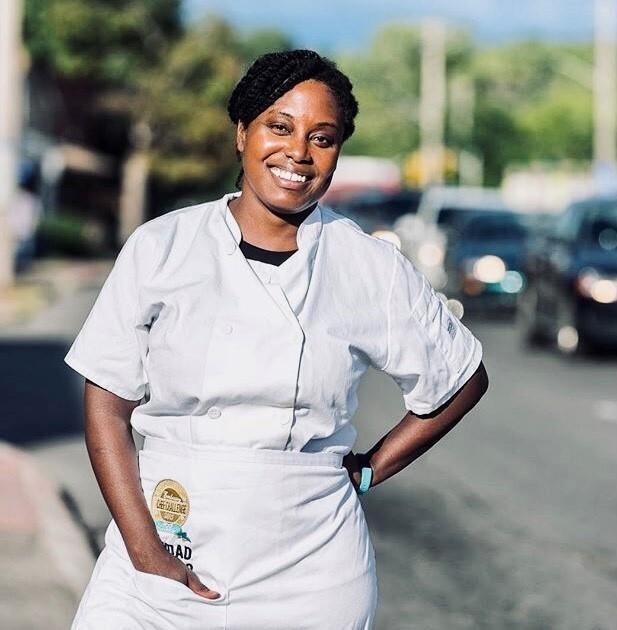
When COVID-19 started spreading through Canada, Resa Solomon-St. Lewis, shown in this handout image, watched business at her Caribbean food company Baccanalle disappear in record speed. With no events and weddings to cater and farmers markers and other artisan shows cancelled, 80 per cent of the Ottawa company's revenue dried up and like many Black restaurant owners, Solomon-St.Lewis was worried about the future. THE CANADIAN PRESS/HO-Dwayne Brown
* MANDATORY CREDIT*
Republished July 08, 2021 - 4:26 PM
Original Publication Date July 08, 2021 - 8:51 AM
TORONTO - When COVID-19 started spreading through Canada, Resa Solomon-St. Lewis watched business at her Caribbean food company Baccanalle disappear.
With no events or weddings to cater and farmers markers and other artisan shows cancelled, 80 per cent of the Ottawa company's revenue dried up and like many Black restaurant owners, Solomon-St.Lewis was worried about the future.
"We were looking at our existing business and thinking this is not going to survive," she recalled.
"I don't think that any Black or minority-owned businesses would necessarily expect... and I didn't expect anybody to come to my rescue."
Black entrepreneurs say that feeling stems from years of being underfunded and facing extra challenges in an industry notorious for low margins, high staff turnover and long hours.
They say the pandemic has made things even tougher and predict that it could be months or even years before they recoup lost earnings, but they're bent on not letting the health crisis get the best of them.
"Black business owners have a hard time accessing capital when it comes to even just starting up their business, and so oftentimes we find that food operators, in addition to owning restaurants, start out with a catering business or as a food truck," said Warren Luckett, a co-founder of Black Restaurant Week, which makes its debut in Toronto on Friday.
"Now one of the largest things that we've been seeing is a labour shortage, being able to find and retain quality labour."
Luckett started Black Restaurant Week in Texas in 2016 with co-founders Falayn Ferrell and Derek Robinson after two Black men, Michael Brown and Alton Sterling, were killed in separate police altercations.
The trio wanted to support Black businesses, so they designed 10-day periods where participating Black-owned restaurants offer specials. Most restaurants saw an increase in sales between 15 and 25 per cent and others reported the event triggered their best week in business ever, Luckett said.
Restaurants Canada estimates that more than 800,000 Canadian workers in the sector lost their jobs or had their hours reduced to zero during the health crisis.
The industry lobby group said as the government's rent and wage subsidies are scaled back this month, most restaurants will struggle to pay staff and suppliers and at least half will have to consider closing down permanently.
Femi Folorunsho's Brampton, Ont. business Kejjis is participating in Black Restaurant Week after being hit hard by the pandemic.
"People would usually come get food for the weekend or for a small party, but when COVID hit everyone started making food at home, so it basically just killed the ordering part of the business," said Folorunsho, whose business specializes in Nigerian food like jollof rice and fried snacks called chin chin.
He tried to be patient and push takeout more, but the pandemic took a toll.
"It's stressful because you wake up and you're not sure you're going to make money," he said.
Solomon-St. Lewis knows that feeling well.
"It's kind of not in our nature so much to say, 'oh, there must be some kind of support out there,'" she said.
"You're going to try and make it, you're going to try and thrive and survive come hell or high water."
Experts have long said Black-owned entrepreneurs tend to be underfunded and research shows many struggle to obtain loans and other financing.
Quantifying how much funding venture capital and private equity Black entrepreneurs in Canada receive is tough because such metrics are seldom tracked, but entrepreneurs and investors estimate it to be on par with — or even worse than — the U.S.
Less than one per cent of the US$543 billion in venture capital offered in the U.S. between 2015 and 2019 was given to Black and African-American founders, according to business information platform Crunchbase.
To keep her business afloat, Solomon-St. Lewis focused on pickup and delivery.
Now that the province has started to reopen, she hopes other revenue streams will return, but doesn't think her business will be back to some semblance of normal until at least 2022.
Meanwhile, Folorunsho estimates it will take two or three years for Kejjis to make back what it lost during the pandemic, but it is starting to see its loyal customers return and bookings for weddings and other gatherings are beginning to trickle in.
"We're ready for it," he said. "People are reaching out. Everyone's getting excited about opening up and I'm happy."
This report by The Canadian Press was first published July 8, 2021.
News from © The Canadian Press, 2021